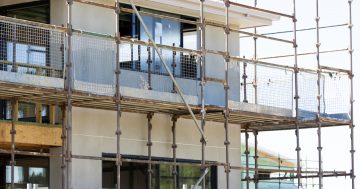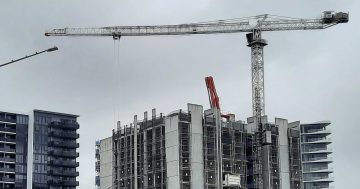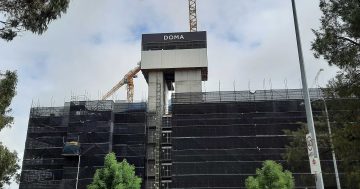
Master Builders ACT says that poor building quality is causing significant stress for homeowners. File photo.
Poor building construction has cost the ACT close to $1 billion over the last eight years according to Master Builders ACT which is calling on the ACT Government to take action.
Master Builders ACT CEO, Michael Hopkins said poor building quality is causing significant stress for homeowners and places those sub-contractors and small businesses who don’t ‘cut corners’ at a commercial disadvantage.
He is calling for a range of reforms to address the problem as well as better enforcement of existing building laws.
“Poor building quality has a significant financial cost on consumers, industry and governments, however the financial impact does not factor in the stress on home owners, and the commercial impact on subcontractors and small businesses who can’t compete with operators who cut corners on quality and safety,” said Mr Hopkins.
He said that a report from the University of NSW released by the ACT Committee inquiring into ACT building quality estimates that for every $100 million spent on construction, over $5 million is wasted as a result of poor building quality.
Master Builders ACT has calculated that if this figure was applied to the value of construction work completed in the ACT since 2010, the cost of poor building quality has been $995 million.

Master Builders ACT CEO Michael Hopkins. File photo.
“According to ABS data there has been $19.9 billion worth of construction worked completed in the ACT since 2010,” Mr Hopkins said.
“Based on UNSW research, the ACT Government’s failure to act has cost the ACT community close to $1 billion.”
Master Builders ACT has consulted widely with its members, community groups and other industry professionals to identify possible solutions to the ACT’s building quality problem.
“There is widespread support amongst key stakeholders for a range of solutions to fix the ACT’s building quality problem,” Mr Hopkins said.
“The MBA is calling for the introduction of engineer, building designer and trade contractor registration and licensing, mandated continuing professional development training, and minimum design and documentation reforms to be introduced as a priority.
“The ACT Government should also ensure existing building laws are enforced and a well-resourced and timely complaints process is implemented,” he said.
“The Canberra community deserves a best practice building regulatory system that keeps pace with the ACT’s record population growth and current building boom.”
Master Builders ACT has made submissions to the 2010 and 2015 building quality review and is in the process of putting together a submission to the 2018 Committee inquiry which it will submit before the November 30 deadline (which has been extended from the original September 30 deadline).
The Standing Committee on Economic Development and Tourism is holding the inquiry which began on March 28 and has received 39 submissions so far.
It is specifically looking at the quality of new buildings in the ACT and any potential or actual causes of poor building quality.
In launching the inquiry earlier this year, the committee’s chair, Jeremy Hanson, said there has been concern in the community for some time about building quality, particularly newer apartment developments.
“As Canberra’s population grows and more housing, including medium and high-density housing, is constructed, it is important that our community has a robust regulatory framework governing building quality,” he said. For more details about the inquiry please click here.
ACT Minister for Building and Quality Improvement, Gordon Ramsay, contested the claim the Government had failed to act, saying it had undertaken a range of reforms as a result of the review of the ACT Building Act and regulatory system.
“This includes the introduction of new powers to condition or refuse licences, powers to require licensees to undertake skills assessments or training, increased penalties for major breaches of the building and licensing laws and further options for the regulator to take action against a licensee to protect the public,” Mr Ramsay said.
“The ACT Government has also expanded statutory warranties to all residential buildings, created a public register of information about licensees and released guides for people building and buying in the ACT.
“Licensing reforms mean it is now more difficult to get a builder licence in the ACT, and for licensees to shift operations between licences to avoid meeting their obligations.”
Mr Ramsay said the government has committed resources in both policy and operational areas to improve compliance with building standards, and further increased its commitment this year to fund additional building inspectors.
“Compliance with building laws is a priority for Access Canberra and the Construction Occupations Registrar,” he said.
“There will be more inspections and a more rapid response to complaints as a result of the additional funding Government has provided.”





















